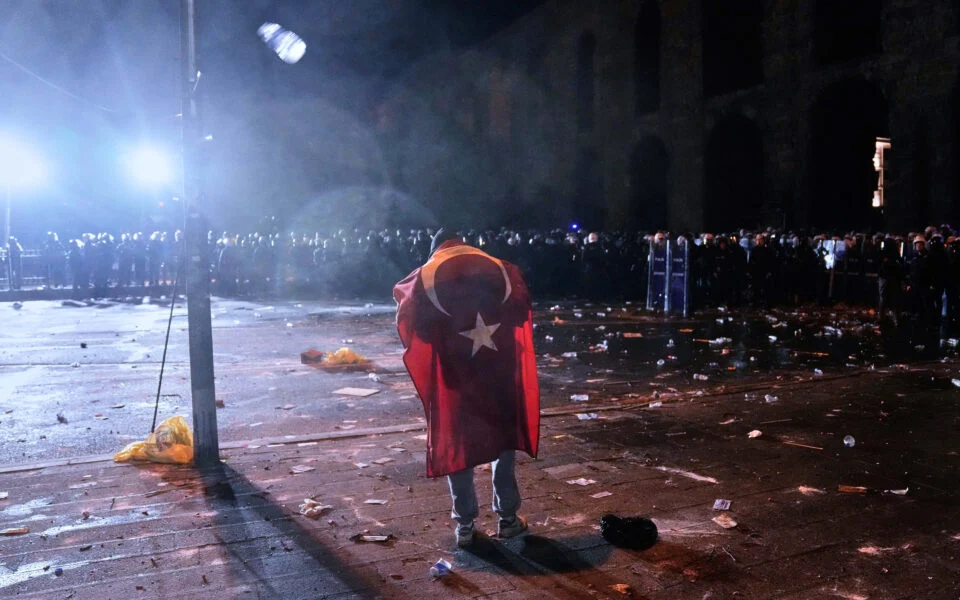By Emre Emirbayer, Year 12
Millions are on the streets. Istanbul is boiling with anger. In cities across Türkiye, chants of ‘Adalet!’ echo through crowds demanding the release of a man who, just weeks ago, was running the country’s largest city. Ekrem İmamoğlu, the elected mayor of Istanbul and a potential presidential candidate, the biggest rival of Tayyip Erdoğan now sits in prison—detained without trial, accused of vague and sweeping crimes that many believe are politically motivated. What began as a shocking arrest has spiralled into the largest wave of protests Türkiye has seen in over a decade.
Türkiye is a republic, a democracy. It is founded on the principles of popular sovereignty with institutions that are meant to reflect the will of its people, not autocracy. The right to vote and be elected has been a cornerstone of the Republic since its foundation under Atatürk. These are not recent gifts—they are rights embedded over generations. In the past decade, Erdoğan’s leadership has stained how Türkiye is perceived abroad—no longer as a modern, secular democracy but as a nation driven by deepening religious influence, economic hardship, and weakened global trust. However, it is essential to not forget what Türkiye really is. Founders of this republic under Atatürk’s leadership have done so with a clear vision: a modern, secular democracy grounded in progress and equality. What we are witnessing now, under Erdoğan, is a slow undoing of that vision—piece by piece, value by value.
Recep Tayyip Erdoğan has ruled Türkiye in some form for twenty years, first as prime minister, then as president. What began as a promise of democratic reform has evolved into a project of personalized power. His rule has driven Türkiye into deep economic and social decay. He attacked judicial independence and freedom of expression as well as economic autonomy. This crippled the very institutions meant to protect the people. That is not all, he has turned courts into political weapons, jailed journalists, shut down universities, and blurred the line between religion and state—not to uplift faith, but to tighten control. At the same time, his obsession with low interest rates collapsed the Lira (Turkish currency), triggered massive inflation and put millions into poverty.
İmamoğlu’s rising popularity and public support appeared to worry Erdoğan, who suddenly found himself faced with a leader capable of uniting people across party lines. In a political climate shaped by fear and fatigue, his calm strength and principled leadership resonated across generations and ideologies. He carries out the concept of modernism and advancement, the ideologies that Türkiye has been built upon, that is being increasingly forgotten under Erdoğan.
But in a move that stunned the nation, he was suddenly arrested on the 23rd of March, 2025, without due process.
This is the first time a politician elected by such a wide margin (over 51% in a critical city like Istanbul) has been jailed without trial. İmamoğlu was detained without interrogation, rushed into custody, and held without trial. These are already unlawful actions, but one should understand that this is not just any arrest. To arrest someone with that level of public mandate, without trial or due process, is not just undemocratic—it’s an outright rejection of the will of the people. Before the arrest, the government tried to disqualify him by revoking his university diploma which was on technical grounds deemed invalid by a university board, not the faculty itself. This is significant because in Türkiye, one is not allowed to run for Presidency without a university diploma. This event was very odd for everyone. Erdoğan had always made efforts to silence opposition, but never to this extent. What we are witnessing is the “dictator-like” actions.
That is exactly why so many Turks are outraged and is the reason behind the immense public reaction. The protests sparked by İmamoğlu’s arrest are unlike anything Türkiye has seen in over a decade. In Istanbul alone, hundreds of thousands of people flooded the streets. From Ankara to İzmir, Diyarbakır to Bursa, over 55 provinces have seen demonstrations—led not just by party loyalists, but by ordinary citizens who feel that something fundamental is being violated. The government’s response? Nearly 1,900 arrests in eight days, including journalists, lawyers, and students. Tear gas, batons, mass detentions. Yet the people continue to march. Because this is not just about politics anymore—this is about principle. Turks outside of Türkiye have also been protesting to support their country and to bring international attention to the situation. Protests have been taking place in England, Germany, USA, Canada and even in Geneva, for justice.
People have had enough. Enough of the fear, enough of the lies, enough of the erosion of everything this country was built on. And the sheer size of these protests proves one thing and one thing only: this is not a little reaction. It is a nationwide reckoning.
And perhaps the most telling part of all is this: if Erdoğan were as strong as he once was, he wouldn’t need to imprison his opponents. The fear, the censorship, the desperate arrests—they don’t signal strength. They signal weakness.
Atatürk’s vision was a blueprint for governance, but more importantly, it was a promise to future generations. And now, in the face of everything trying to undo that promise, it is the people—chanting, marching, refusing to be silenced—who are keeping it alive.



